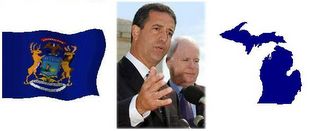CAFTA
Thursday, June 30, the Senate passed the Central American Free Trade Agreement, 54-45 (though, interestingly, it wasn't along party lines; lots of cross-overs). It is intended, as the act says, "to establish free trade between the United States, Costa Rica, the Dominican Republic, El Salvador, Guatemala, Honduras, and Nicaragua through the reduction and elimination of barriers to trade in goods and services and to investment".
Senator Feingold has been very vocal about his opposition to this agreement, and following its passage, he said:
CAFTA promises more of the same devastation brought by the agreements that have come before it – putting our businesses, workers and farmers at a competitive disadvantage, while also undermining the economic development that might benefit workers, farmers and small businesses in Central America.He said a lot more than that too, but this paragraph sums up his position very well. Senator Feingold shows through his remarks on the Senate floor that free trade comes with many costs, many jobs lost, many communities hurt.
For myself, this is an area that I've had some trouble in. I am a supporter of free trade, and initially disagreed with Feingold on this issue. Free trade has been a central issue for Democrats since Thomas Jefferson and Andrew Jackson, because it allows the importation of cheaper goods, and cheaper goods help the consumer. And, after all, government should be about helping people. Most people even forget that one of Woodrow Wilson's Fourteen Points for peace following World War I was to abolish all barriers on trade in Europe and among the nations that had been at war.
Free trade stops wars. Simple as that.
Well, that's how it's supposed to be, anyway. The idea that when nations become dependent on one another, when they have to rely on their neighbors and the strength of their neighbors' economies, that it will discourage them from going to war. And really, why go to war over mineral resources when you can just buy them peacefully?
Further, if the foreign competition makes a product for half the cost and sells it at half the price, it encourages domestic businesses to refine their methods and save money and become more efficient. It keeps us from stagnating.
That's the theory. And really, the theory works, too. The European Union (especially pre-expansion) proved it. A dozen different countries cooperating, with no barriers whatsoever, became an economic power to rival the United States. But here's where the problem is: the UK and France, in their standard of living, don't differ too much. It's trade among equals. Even with NAFTA and trade with Canada, there was some shifting, but it was minimal. But there's a big difference between Canada and Costa Rica. It's not a level playing field. When it's not a level playing field, domestic businesses, trying to compete and improve efficiency and cut costs, find themselves cutting jobs and moving to countries where they can pay workers two cents an hour.
Here in Michigan, NAFTA has been both good and bad. In the first six years, from 1993 to 1999, NAFTA did help some. As the Mackinac Center found:
- Although its exports to Mexico had dropped 25 percent in the four years prior to NAFTA, Michigan-made goods exported to Mexico surged 148 percent under NAFTA.
- The Commerce Department says 83.3 percent of Michigan's industries have seen their sales to Canada rise since NAFTA took effect.
- And 67 percent of Michigan industries saw exports to Mexico climb.
- The state's unemployment rate has dropped from 8.2 percent the year before the treaty took effect to less than 4 percent this year.
An Economic Policy Institute report in 2001 found that 544,750 manufacturing jobs had been lost around the country, with 25,912 motor vehicle-related jobs lost in Michigan alone. Michigan had the second-highest total job loss, at 46,817, following California. And since then, with the Bush recession and generally slow economic growth, things have only gotten worse. In May, our unemployment rate rose to 7.1 percent.
At this point, I'm afraid that any help we can get to save a few jobs is needed. Central America is not an equal, and this agreement does nothing to help improve their standards of living or environmental standards. This agreement will further hurt Michigan and other manufacturing states, as well as the country as a whole. So.
Thank you, Senator Feingold, for opposing it.




0 Comments:
Post a Comment
<< Home